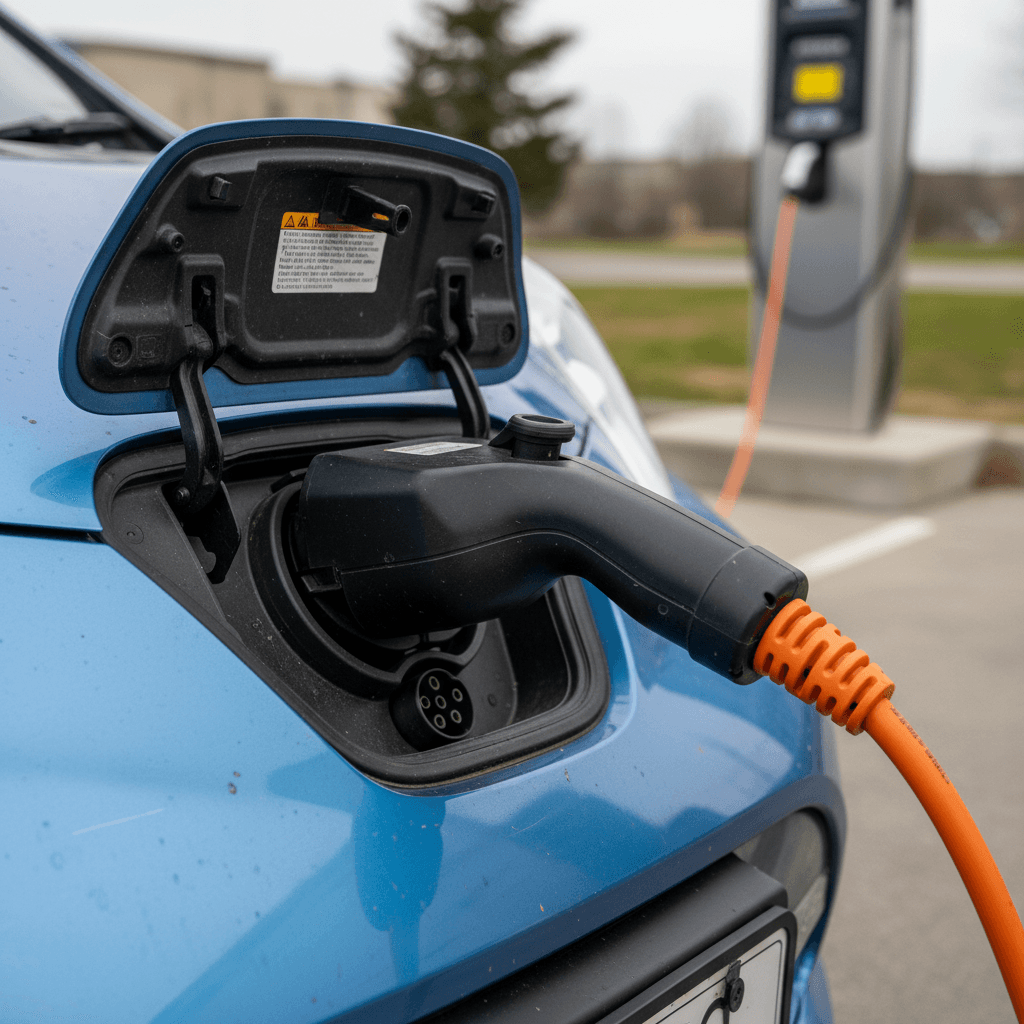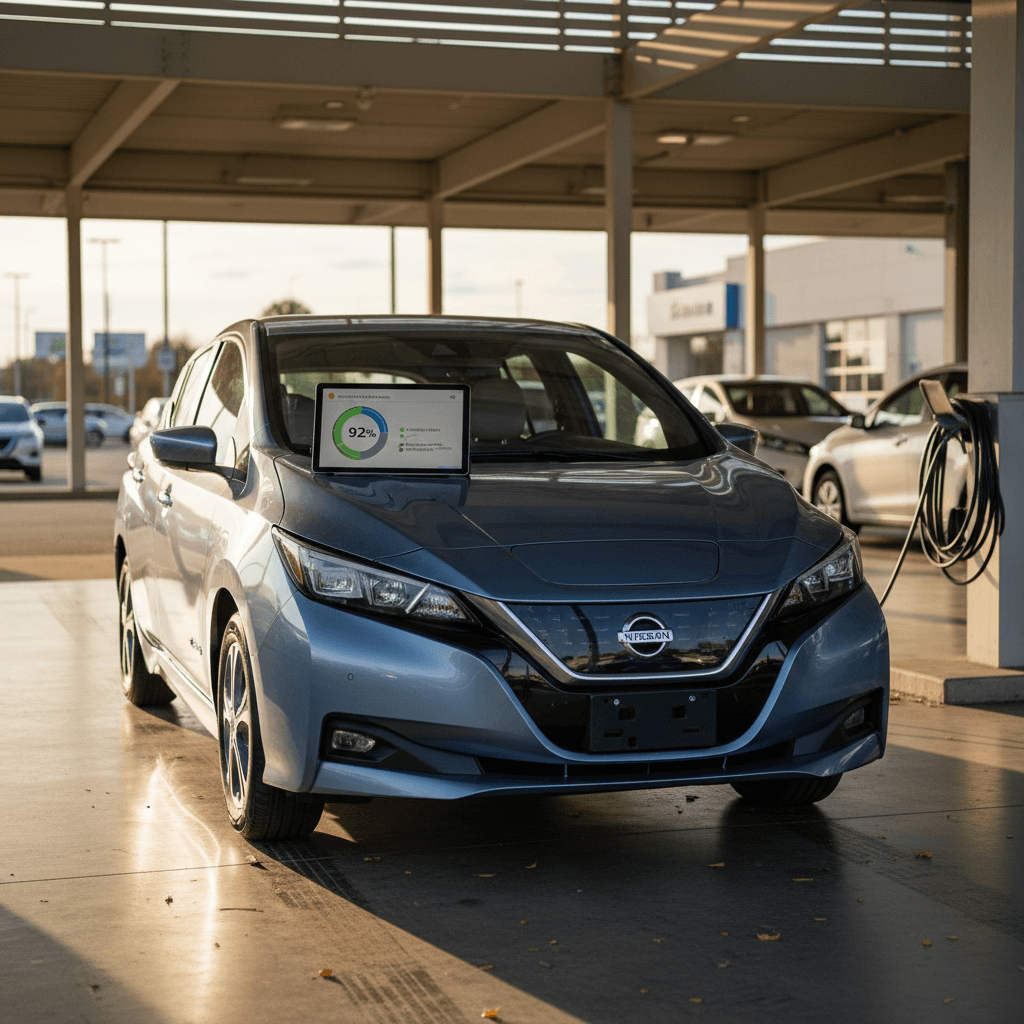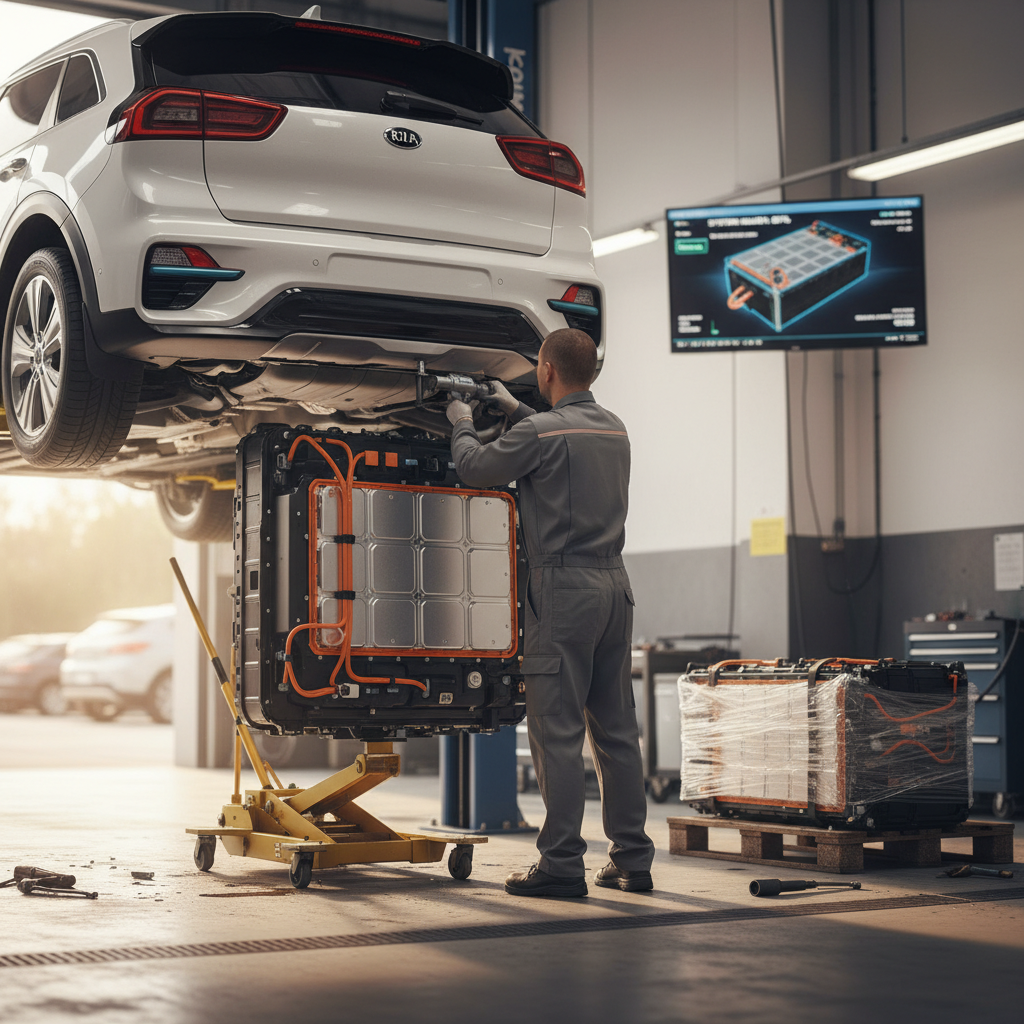If you’re hunting for a Nissan Leaf electric car for sale, you’re looking at one of the most affordable ways to get into a pure EV. The Leaf has been on U.S. roads since 2011, which means a wide range of prices, battery sizes, and conditions. The upside is value; the downside is that not every Leaf on the market is a good deal. This guide will walk you through the model years, batteries, real-world range, what to avoid, and how Recharged helps you buy a Leaf with verified battery health.
Quick Take
Why the Nissan Leaf Is Still a Smart Buy
Nissan Leaf by the Numbers
The Leaf was one of the first mass-market EVs, and that early start is your advantage today. There are thousands of used Nissan Leaf electric cars for sale, which drives prices down and gives you choices you won’t find with newer nameplates. For short commutes, second-car duty, or a low-cost way to try EV ownership, it’s hard to beat.
Best Use Case
Nissan Leaf Generations, Batteries & Real-World Range
Before you pick a Nissan Leaf electric car for sale, you need to know which generation and battery you’re looking at. Range and long-term satisfaction depend heavily on this.
Three Generations of Nissan Leaf
How body style and tech evolved from 2011 to the new crossover
1st Gen (2011–2017)
Compact hatchback, 24 or 30 kWh battery. Earlier cars are the cheapest but have the least range and older battery chemistry.
2nd Gen (2018–2024)
Updated hatchback styling, 40 or 62/60 kWh batteries, better performance and safety tech. Sweet spot for many used buyers.
3rd Gen (2025+)
New subcompact crossover body, up to around 300 miles of estimated range and NACS fast charging. These will mostly be new or late-model used for now.
Nissan Leaf Range & Battery by Model Year
EPA-rated ranges are approximate and assume a healthy battery. Older, high-mileage cars may have significantly less
| Model years | Battery (kWh) | Approx. EPA range | Typical role |
|---|---|---|---|
| 2011–2012 | 24 | 73 mi | Shortest-range commuter / city car |
| 2013–2015 | 24 | 75–84 mi | Budget city car, very affordable |
| 2016–2017 | 24 or 30 | 84–107 mi | Transitional years; 30 kWh offers noticeable bump |
| 2018–2019 | 40 | 151 mi | Solid commuter, good mix of price and range |
| 2019–2022 (Plus) | 62 | 215–226 mi | Best long-range Leaf hatchback option |
| 2020–2024 | 40 | 149 mi | Updated styling and features, modest range |
| 2023–2024 (SV Plus) | 60 | 212 mi | Later long-range hatchback with newer tech |
Use this table to narrow down which Nissan Leaf electric car for sale fits your daily driving needs.
Don’t Buy on Range Numbers Alone

What to Look For in a Used Nissan Leaf
Walking a used-car lot or scrolling listings is one thing; evaluating an individual Nissan Leaf electric car for sale is another. Because the Leaf has been around so long, condition and specification vary widely. Here’s where to focus.
Key Checks When You Inspect a Nissan Leaf
1. Confirm battery size and trim
Look at the window sticker photo or build sheet. A Leaf S from 2018–2024 usually has a 40 kWh pack; "SV Plus" or "SL Plus" indicate the larger pack (62 or 60 kWh).
2. Check battery bars on the dash
The Leaf’s instrument cluster shows 12 capacity bars when new. Fewer bars mean degradation. A serious buyer should always pair this with a professional diagnostic, not rely on bars alone.
3. Review charging history
Ask how the previous owner charged. Heavy reliance on DC fast charging and frequent 100% charges in hot climates tend to accelerate battery wear.
4. Verify charging compatibility
Most used Leafs use CHAdeMO for DC fast charging and J1772 for Level 2. Public fast-charging options for CHAdeMO are shrinking in many regions, so make sure that fits your real-world routes.
5. Inspect tires, brakes, and suspension
EVs are easy on brakes but heavier than comparable gas cars. Look for uneven tire wear or suspension noises on a test drive, especially over bumps.
6. Check for software updates and recalls
Ask for records or run the VIN through an official recall tool. Recent recalls have focused on battery behavior during fast charging for some model years.
How Recharged Helps
Battery Health & Degradation: The Big Question
With any Nissan Leaf electric car for sale, the battery is the story. Unlike gas cars where mileage tells you most of what you need to know, a Leaf’s value lives or dies on how much usable capacity is left in that high-voltage pack.
Why older Leafs lose range faster
- First-generation Leafs (2011–2015) used air-cooled batteries, which are more sensitive to heat.
- Hot-climate cars (think Arizona, Texas, Southeast) typically show faster degradation.
- Frequent DC fast charging and storing the car at 100% charge also accelerate wear.
Why newer Leafs do better
- Second-generation Leafs (2018+) use improved battery chemistry and thermal management.
- 40, 60, and 62 kWh packs tend to hold capacity better, especially in moderate climates.
- Even so, real-world range will rarely match the original EPA sticker on a 5–7 year-old car.
Important Safety Note
At Recharged, our technicians use specialized diagnostics as part of the Recharged Score to estimate current battery health, expected real-world range, and how that compares to when the car was new. That report is shared with you up front, so you know whether a particular Leaf is a short-hop city car or still a solid highway commuter.
Nissan Leaf Pricing: How Much Should You Pay?
Used Nissan Leaf prices move with the broader EV market, but there are consistent patterns by battery size and age. Exact numbers will depend on mileage, condition, and your local market, yet you can use these bands as a sanity check when you see a Nissan Leaf electric car for sale.
Typical U.S. Used Nissan Leaf Price Bands (Late 2025 Snapshot)
These are ballpark asking-price ranges, not offers. Expect variation by mileage, options, and region.
| Model years & battery | Typical role | Rough asking-price band* | Who it fits |
|---|---|---|---|
| 2011–2015 | 24 kWh | Oldest, shortest-range cars | Often well under $10,000 | City-only drivers with very short commutes |
| 2016–2017 | 30 kWh | Transitional, moderate range | Roughly $8,000–$13,000 | Budget buyers needing ~80–100 real-world miles |
| 2018–2020 | 40 kWh | Modern styling, decent range | Roughly $11,000–$18,000 | Most daily commuters; great value sweet spot |
| 2019–2022 | 62 kWh Plus | Longest-range hatchback Leafs | Roughly $15,000–$23,000 | Drivers who need highway flexibility and road-trip capability |
| 2023–2024 | 40 or 60 kWh | Newest hatchbacks | Roughly $18,000+ | Shoppers wanting late-model tech at a discount from new |
Use this table to spot Leafs that are suspiciously cheap, or overpriced.
About Those Price Ranges
Nissan Leaf vs Other Affordable EVs
If you’re cross-shopping a Nissan Leaf electric car for sale with other low-cost EVs, think Chevy Bolt EV, BMW i3, or Hyundai Ioniq Electric, it helps to be clear about where the Leaf shines and where it doesn’t.
How the Leaf Compares to Other Budget EVs
Strengths and trade-offs versus common alternatives
Where Leaf wins
- Purchase price: One of the cheapest used EVs on the market.
- Parts availability: Long production run means easier servicing.
- Simple ownership: Straightforward tech, easy to live with.
Where Leaf falls short
- Fast charging: CHAdeMO ports limit DC fast-charging locations vs CCS/NACS rivals.
- Early batteries: Older, air-cooled packs can lose range faster.
- Highway trips: Shorter range and fewer fast chargers mean more planning.
Who it’s perfect for
- Owners with home or workplace charging.
- Multi-car households needing a commuter or errand runner.
- Budget-conscious buyers who value low running costs over maximum range.
Think About Your Charging Map
Financing, Trade-Ins & Buying a Leaf Online
Once you’ve decided that a Nissan Leaf electric car for sale fits your lifestyle, the next questions are how to pay for it and how to handle your current vehicle. This is where a modern EV-focused marketplace can make life easier.
Financing a used Leaf
- Many lenders now understand EVs, but not all price battery condition into their decisions.
- With Recharged, you can pre-qualify for financing online with no impact to your credit and see terms tailored to the specific car you’re considering.
- Lower running costs (no gas, minimal maintenance) can make a slightly higher payment pencil out over time.
Handling your trade-in
- If you have a gas or electric car to sell, Recharged can provide an instant offer or consignment option.
- That means you can roll equity into your Leaf, or just simplify the logistics of selling one car and buying another.
- Nationwide delivery and a digital purchase process help you shop Leafs beyond your local inventory.
Try Before You Commit
Checklist: Before You Buy a Nissan Leaf
Use this condensed checklist as a final pass before you put money down on any Nissan Leaf electric car for sale.
Final Pre-Purchase Checklist
Confirm the battery and trim
Double-check whether you’re getting a 24, 30, 40, 60, or 62 kWh pack and whether it’s a Plus model. That’s the core of range and value.
Get a real battery-health report
Ask for objective diagnostics, not just a photo of the dashboard bars. With Recharged, the Recharged Score report spells out remaining capacity and expected range.
Match range to your real route
Map your typical round trip and add a buffer for bad weather and detours. A 40 kWh Leaf can be perfect for 40–60 mile days but tight for 90–100 mile days without workplace charging.
Check charging options where you live
Confirm you can install or already have a Level 2 charger at home, and that CHAdeMO stations along your usual routes meet your needs.
Review recalls and service history
Make sure any applicable software or battery recalls have been or will be addressed. Ask for basic service records, especially tires and brakes.
Compare total cost of ownership
Look at electricity vs gas, insurance, and maintenance. A Leaf’s low operating cost can offset a slightly higher monthly payment.
FAQ: Nissan Leaf Electric Car for Sale
Frequently Asked Questions About Buying a Nissan Leaf
Bottom Line: Is a Nissan Leaf Right for You?
If you mainly drive in town, have access to home or workplace charging, and want a low-cost entry into EV ownership, a Nissan Leaf electric car for sale should be on your shortlist. It won’t win any road-trip range contests, and early batteries demand more scrutiny, but that’s exactly why there are so many bargains.
Focus on the right generation and battery size for your needs, insist on a clear view of battery health, and make sure the price reflects reality, not just the odometer reading. When you buy through Recharged, you get a Recharged Score Report, EV-specialist support, nationwide delivery, and flexible financing options so you can enjoy simple, transparent Leaf ownership from day one.

